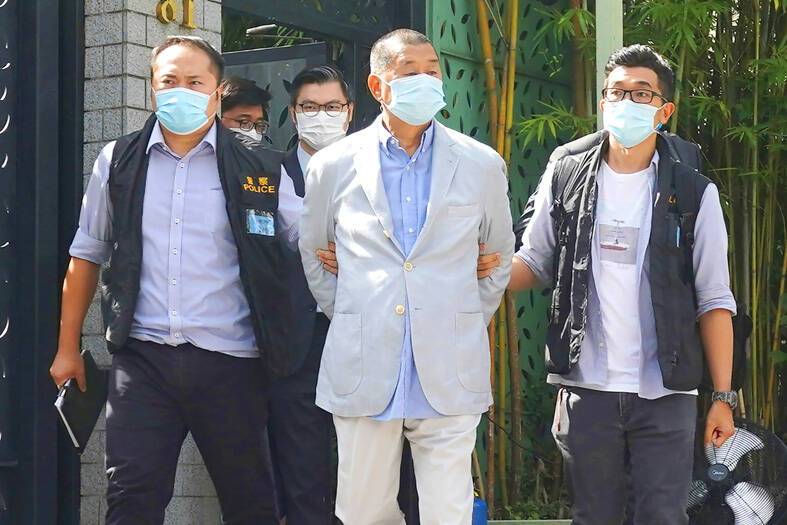A legal battle over Hong Kong’s effort to prosecute media tycoon Jimmy Lai (黎智英) on national security charges has made the once-unthinkable an imminent threat: moving sensitive cases to mainland Chinese courts.?
While Beijing has asserted the right to take over “complex” cases involving foreign nations since imposing a sweeping National Security Law on Hong Kong in 2020, it has so far not exercised the power. Instead, dozens of security cases are being prosecuted in local courts in the former British colony.
However, Lai’s foreign collusion case is testing Beijing’s patience for Hong Kong’s legal traditions, including an emphasis on transparency, precedent, judicial independence and the rights of the accused. Those values were on display last week, when Hong Kong’s highest court ruled that the founder of the now defunct Apple Daily newspaper could hire a renowned UK-based lawyer to defend him.

Photo: AP
Hong Kong Chief Executive John Lee (李家超), a Beijing appointee, responded by requesting China’s top legislative body to intervene and prevent lawyers based overseas from participating in such cases.
Hong Kong’s sole representative on that body subsequently suggested that defendants who failed to find local lawyers could find their cases transferred to Chinese courts, where national security trials are speedier and more secretive.
“If such difficulties really arise, they can be sent back to the mainland for trial,” Tam Yiu-chung (譚耀宗), a member of the National People’s Congress Standing Committee, told reporters on Sunday in Hong Kong.
Although Tam said such action would only be necessary in a “special case,” the threat illustrates the growing pressure on the judicial independence often cited as a reason for Hong Kong’s success as a global financial center.
Local courts risk being overruled by Beijing or losing control of cases altogether if they break with the government.
The issue of transferring cases to mainland courts was at the center of historically large and sometimes violent protests that erupted in 2019, which ultimately prompted Beijing to impose the security law and arrest Lai.
Those demonstrations were sparked by since-withdrawn extradition legislation that would have allowed the territory to send suspects in some criminal cases to the mainland.
“This will likely be viewed as a threat in the Hong Kong courts and legal profession to go along with Beijing’s demands or else, even when those demands are articulated indirectly through a supporter or the media,” said Michael Curtis Davis, a professor of law and International Affairs at Jindal Global University in India and a former law professor at the University of Hong Kong. “We can expect these sorts of threats to continue and be used in other high-profile cases when Beijing wants to pressure the courts or others to do its bidding.”
When asked to comment on whether a request had been made to transfer Lai’s case to the mainland, a spokesman for the government’s Security Bureau referred to Article 55 of the National Security Law.
That section allows Beijing to exercise jurisdiction over cases involving the four crimes listed in the law under certain conditions, such as being “complex due to the involvement of a foreign country.”
Hong Kong has so far charged at least 88 people on allegations related to those four crimes: secession, subversion, terrorism and foreign collusion.

PRECARIOUS RELATIONS: Commentators in Saudi Arabia accuse the UAE of growing too bold, backing forces at odds with Saudi interests in various conflicts A Saudi Arabian media campaign targeting the United Arab Emirates (UAE) has deepened the Gulf’s worst row in years, stoking fears of a damaging fall-out in the financial heart of the Middle East. Fiery accusations of rights abuses and betrayal have circulated for weeks in state-run and social media after a brief conflict in Yemen, where Saudi airstrikes quelled an offensive by UAE-backed separatists. The United Arab Emirates is “investing in chaos and supporting secessionists” from Libya to Yemen and the Horn of Africa, Saudi Arabia’s al-Ekhbariya TV charged in a report this week. Such invective has been unheard of

US President Donald Trump on Saturday warned Canada that if it concludes a trade deal with China, he would impose a 100 percent tariff on all goods coming over the border. Relations between the US and its northern neighbor have been rocky since Trump returned to the White House a year ago, with spats over trade and Canadian Prime Minister Mark Carney decrying a “rupture” in the US-led global order. During a visit to Beijing earlier this month, Carney hailed a “new strategic partnership” with China that resulted in a “preliminary, but landmark trade agreement” to reduce tariffs — but

SCAM CLAMPDOWN: About 130 South Korean scam suspects have been sent home since October last year, and 60 more are still waiting for repatriation Dozens of South Koreans allegedly involved in online scams in Cambodia were yesterday returned to South Korea to face investigations in what was the largest group repatriation of Korean criminal suspects from abroad. The 73 South Korean suspects allegedly scammed fellow Koreans out of 48.6 billion won (US$33 million), South Korea said. Upon arrival in South Korea’s Incheon International Airport aboard a chartered plane, the suspects — 65 men and eight women — were sent to police stations. Local TV footage showed the suspects, in handcuffs and wearing masks, being escorted by police officers and boarding buses. They were among about 260 South

Chinese President Xi Jinping’s (習近平) purge of his most senior general is driven by his effort to both secure “total control” of his military and root out corruption, US Ambassador to China David Perdue said told Bloomberg Television yesterday. The probe into Zhang Youxia (張又俠), Xi’s second-in-command, announced over the weekend, is a “major development,” Perdue said, citing the family connections the vice chair of China’s apex military commission has with Xi. Chinese authorities said Zhang was being investigated for suspected serious discipline and law violations, without disclosing further details. “I take him at his word that there’s a corruption effort under